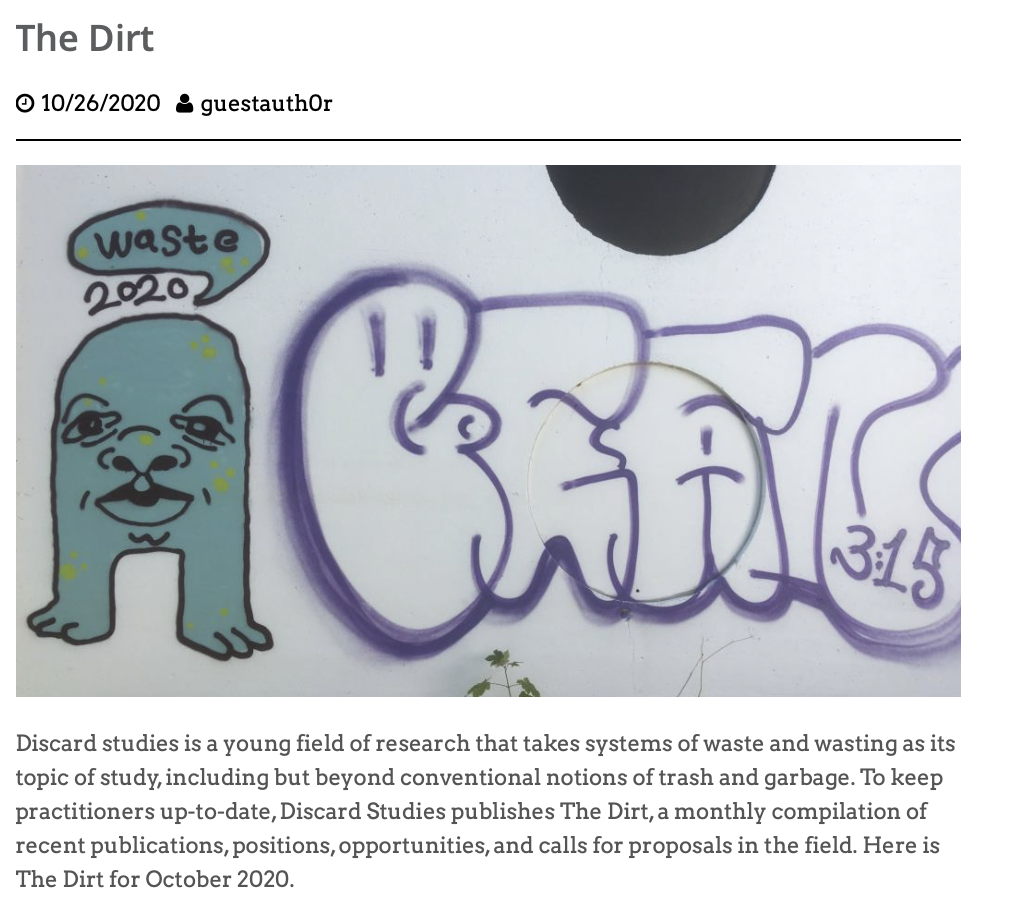Giant Terror Wasp Hunter Couture
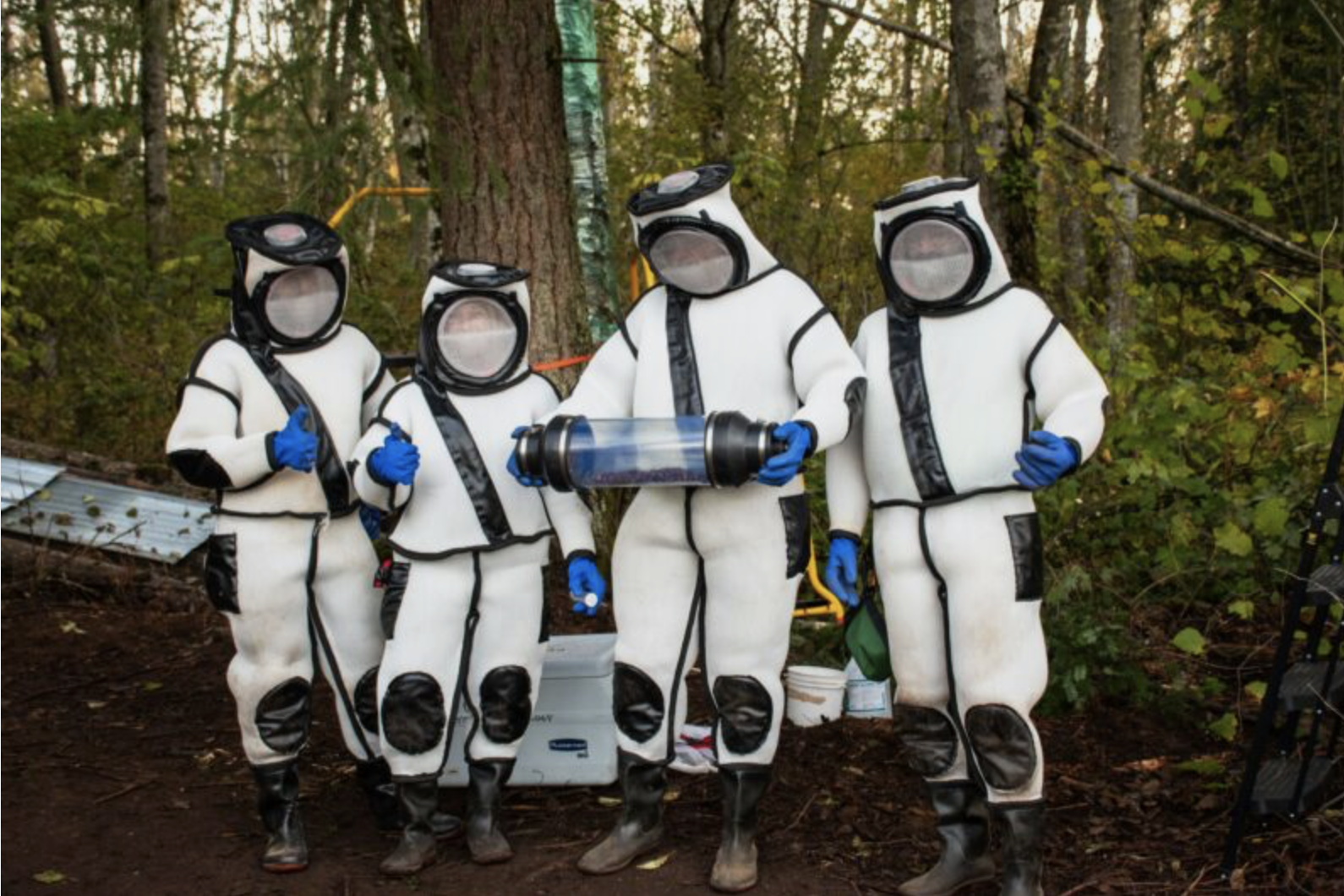
Some pleasant information on the suits used by entomologists hunting giant Asian wasps on the West Coast of the US
Previous outfits were found to be lacking and the wasp hunters did not have a huge budget:
Normal beekeeping outfits won’t cut it. Last year, when a Canadian team tackled an Asian giant hornet nest in Nanaimo, British Columbia, where the hornet first turned up in North America, the person tasked with the extraction wore two pairs of pants as well as a Kevlar vest under his regular apiarist attire. Despite all that, he described the seven stings he suffered as “similar to having red-hot thumb tacks driven into the flesh.” So what’s an Asian giant hornet hunter to do? Head to Amazon, of course.
The agency ended up ordering about 15 of the $170 suits, which, according to the Amazon listing, are made by a company called Vevin. They’re advertised as professional anti-wasp, -hornet, and –yellow jacket protective apparel—though not specifically as being protective against Asian giant hornets. The one-piece suits are constructed of three layers: a 20-millimeter-thick slab of foam sandwiched between an inner and outer coating of soft plastic mesh. Black nylon taping reinforces the seams, zipper, and the top of the attached hood, where a battery-powered fan moves air around and keeps the wearer cool.
Source: What to wear when you’re battling giant, venomous hornets
Whatever happens Tuesday – Change is headed in the right direction
 |
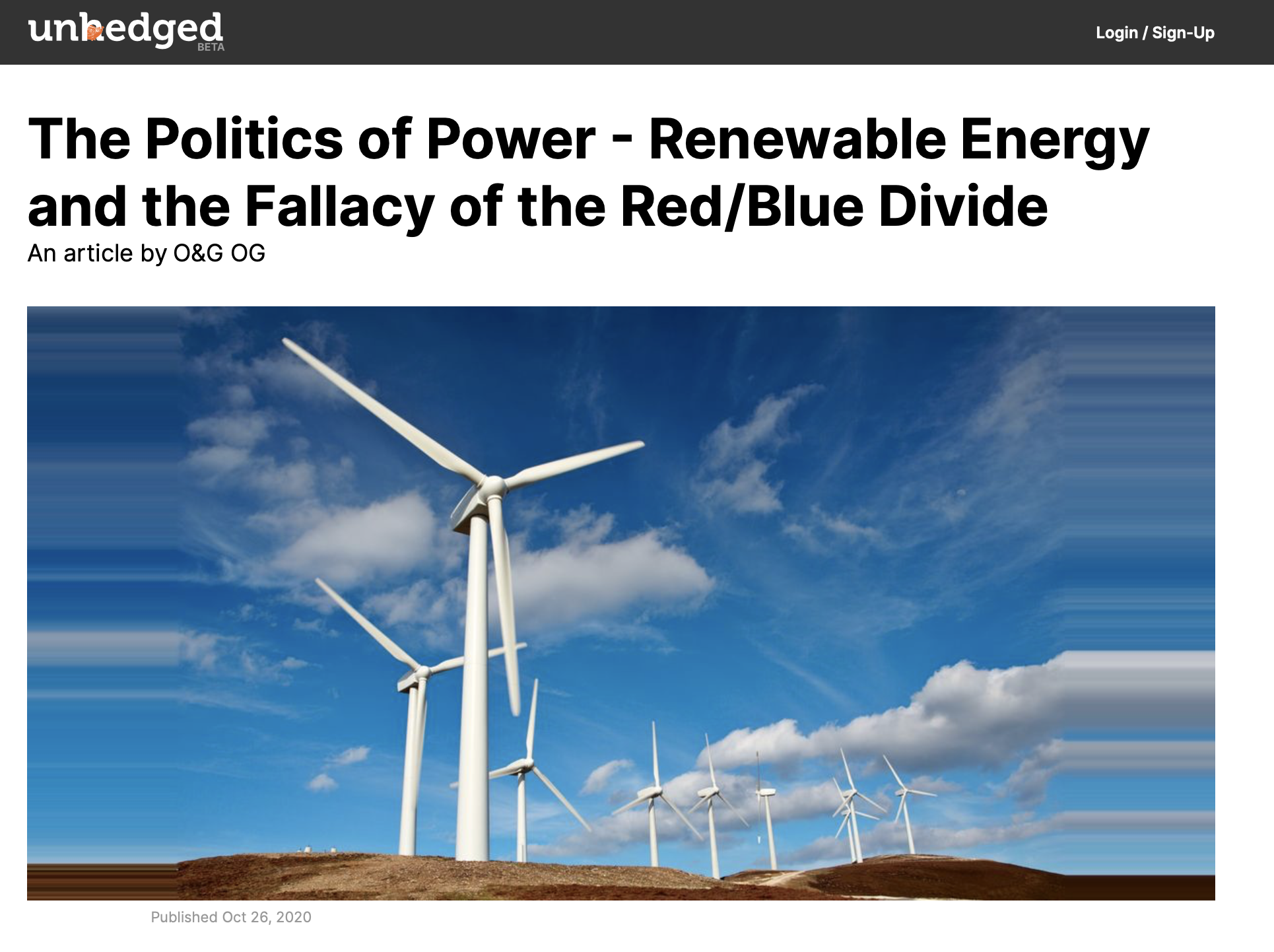 |
 |
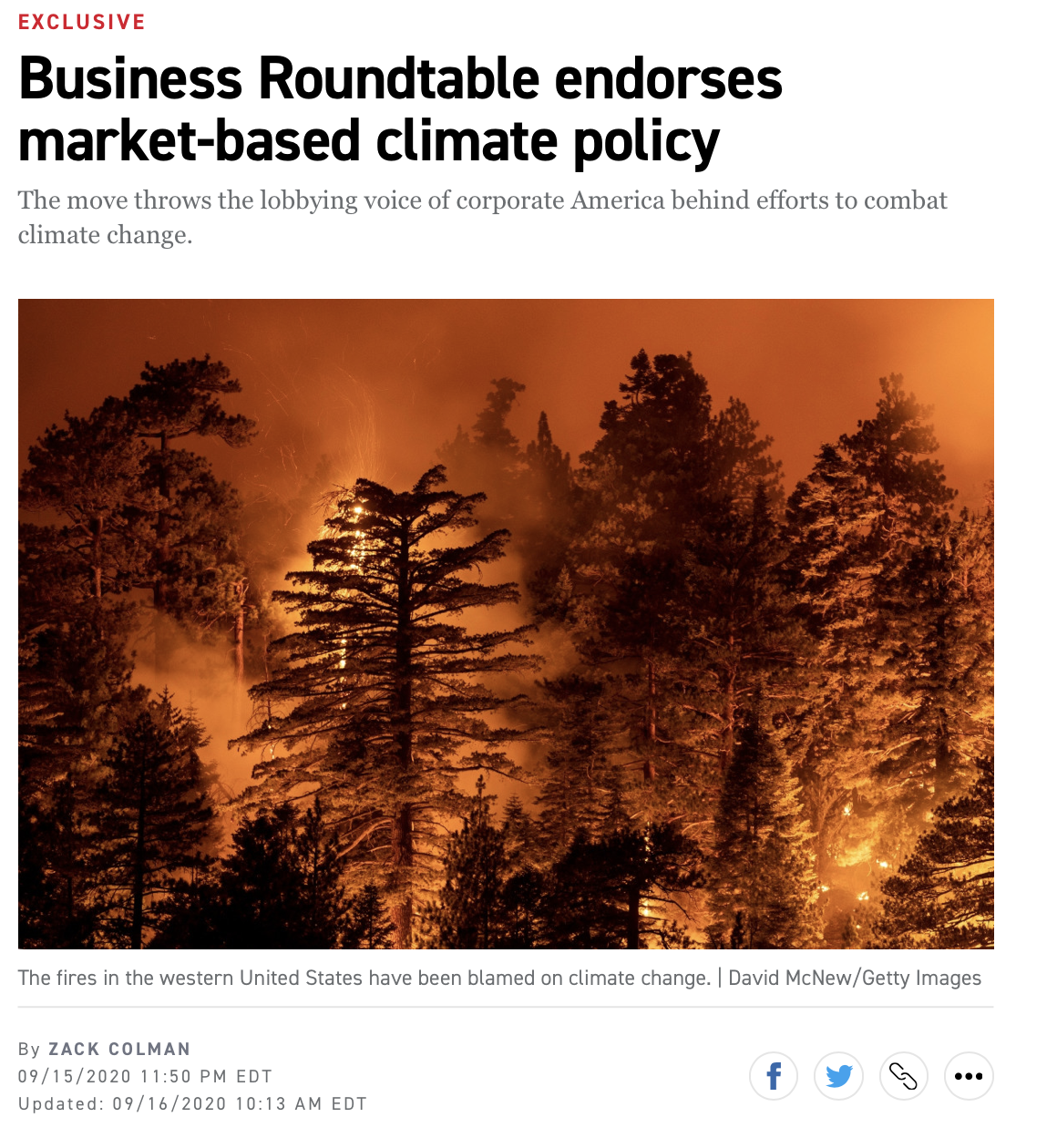 |
Solar is now ‘cheapest electricity in history’, confirms IEA:
The world’s best solar power schemes now offer the “cheapest…electricity in history” with the technology cheaper than coal and gas in most major countries.
That is according to the International Energy Agency’s World Energy Outlook 2020.
The Politics of Power – Renewable Energy and the Fallacy of the Red/Blue Divide
In July 2020, three Republican states (TX, OK, IA) generated more wind & solar electricity generation on a trailing-12-month basis than all 20 Democratic states, plus Washington, D.C. combined
Nearly 30% of the Democratic state power stack is generated from renewable power vs 15% for the Republican state power stack, but Red states generate more renewable power than Blue states
Republican states generate just over 50% of all renewable power in the US currently, but 2/3 of all wind and solar power
Texas dominates U.S. wind and solar renewable scene at nearly 25% of U.S. generation, an amount totaling over 70% of all wind and solar generation from Blue states
Climate Change Is Forcing the Insurance Industry to Recalculate
Insurers are at the vanguard of a movement to put a value today on the unpredictable future of a warming planet
Business Roundtable endorses market-based climate policy
The Business Roundtable, a major trade association that includes the heads of some of the largest and most influential companies in the U.S. as members, is endorsing a “market-based mechanism” as part of a plan to sharply curb greenhouse gas emissions that cause climate change,
The move, which was first reported by POLITICO on Tuesday, throws the lobbying voice of those executives from companies with $7 trillion in annual revenues behind efforts to combat climate change, reflecting a stark division between the business community and the Trump administration.
The Dirt: Recent research & publications on Discard Studies
Recent publications: articles, books, etc. on waste, discards, discard studies…
10/26/2020 roundup is here.
Without a ‘Right to Garden’ Law, It May Be Illegal to Grow Your Own Food

City ordinances that require a well-manicured lawn and ban most kinds of gardening + bitchy neighbors + probably some racial crap = you can’t grow your own food in your own yard. My solution: don’t live in places that have such laws.
Nicole and Dan Virgil, who live in Elmhurst, a suburb of Chicago, are dedicated vegetable gardeners.
A few weeks after their hoop house went up, Nicole found a violation notice from the city taped to it. “I thought it had to be some kind of misunderstanding, that it couldn’t possibly be serious,” recalls Nicole. She had assumed that the hoop house, a lightweight temporary structure akin to a tent, wouldn’t be subject to city regulations.
After several discussions with city officials, 16 public meetings over two years, a lawsuit filed by the Virgils, and a subsequent appeal, the city remained unmoved, siding with the neighbor who had filed the original complaint. The Virgils found themselves stuck in a catch-22 of having an unpermitted temporary structure while having no way to get a permit for a temporary structure. Facing a daily fine, they took down their hoop house.

Inside the Virgil’s hoop house.
Why would a backyard hoop house be so contentious? The Virgils are among many home gardeners around the country who have triggered a city or county ordinance that restricts edible gardening. It’s fairly common for local governments to have a broadly written landscape ordinance, which may not explicitly prohibit vegetable gardening but requires grass or similar vegetation and calls for plants within a certain height.
The neatly manicured yard has long been a status symbol; lawns first appeared in the 1700s on European estates, whose owners could afford to have high-maintenance living carpets. And the suburbs have historically differentiated themselves from “ag land.” “A lot of rural land was developed into suburban municipalities, and the zoning code was changed to prohibit agricultural uses—people didn’t want a pig farm to move in,” says Laura Calvert, the former executive director of Chicago-based nonprofit Advocates for Urban Agriculture.
Given the context, it’s easy to see how the neighbors might look down on home gardening as a form of subsistence farming. “People think that it’s beneath them,” says Nicole, who documented her struggle in a recent op-ed for the Chicago Tribune.
The goal of these ordinances, whether they’re about landscaping or temporary structures, is to maintain property values. (The racist practice of redlining, which kept African Americans out of the suburbs, was rationalized in the same way.) However, the perception that growing vegetables will drive down home values is “not rooted in any evidence,” as Calvert points out.
Wealthy investors seem to be exploiting land-conservation tax breaks, and the Senate is taking notice
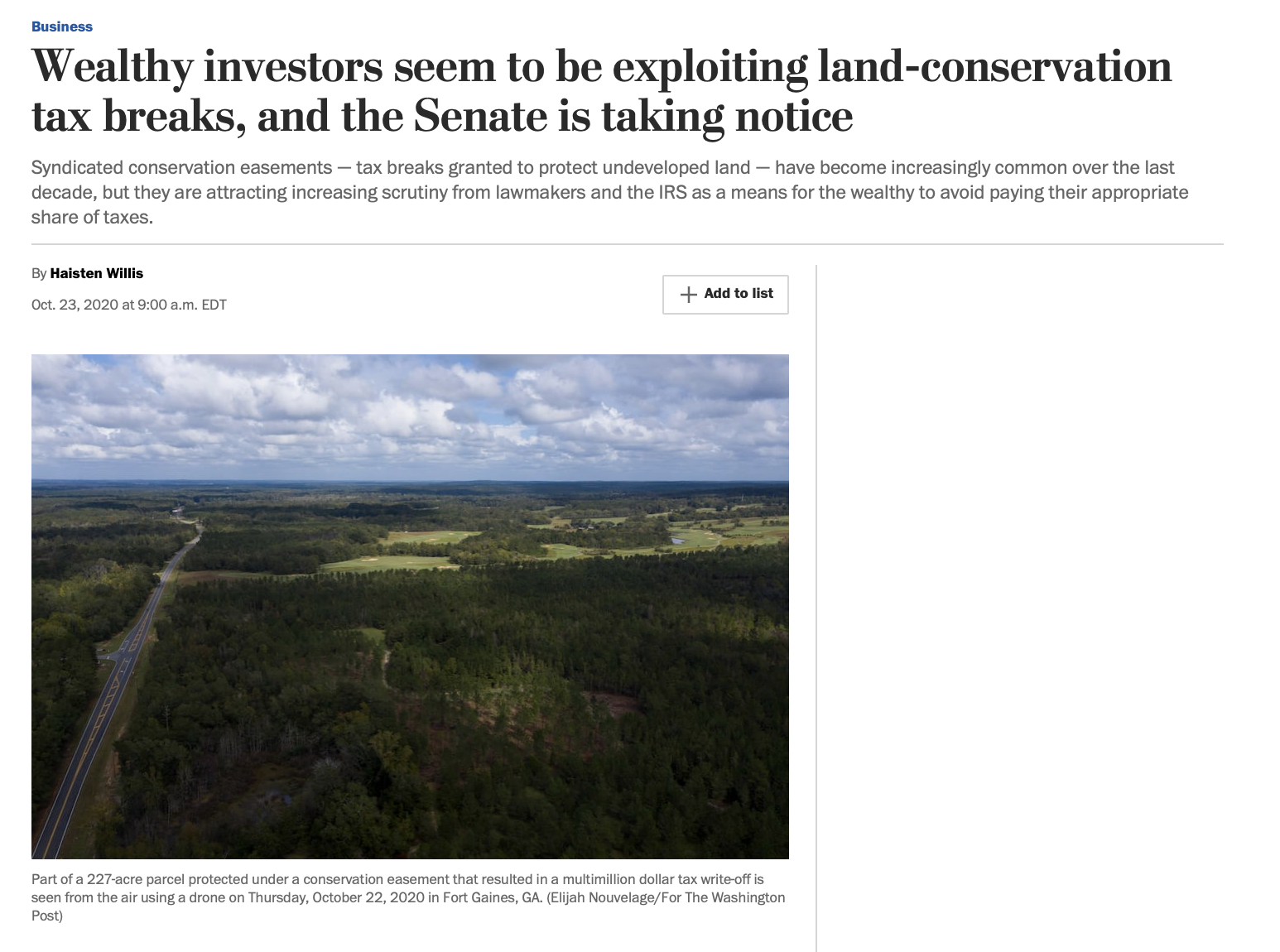
Source: Washington Post
Conservation easements are a means of protecting undeveloped land. Such easements typically consist of tax breaks granted landowners to keep the land undeveloped. For example, the owner of a large tract of forest in a rapidly developing region might seek a conservation easement on their property if they want to keep the land undeveloped, but not pay the growing taxes driven by adjacent development. Conservation easements have been a vital means of preserving land (and natural spaces) which would otherwise have to be sold due to the tax burden.
As with any other good policy, there are those who will take advantage of it. This Washington Post story details a tax scheme (racket, fraud, etc.) whereby groups of wealthy people buy into (as a syndicate) a large tract of land in some out of the way place (in this case, rural Georgia) and take the conservation easement tax breaks. In this case, the land is unlikely to develop as it is in an area of rapidly declining population. But the conservation easements are still a legal option.
Syndicated conservation easements, such as the one in Clay County, grant write-offs to multiple partners, each buying a share in a tract of land. They are attracting increased scrutiny from lawmakers and the IRS as a means for the wealthy to avoid paying their appropriate share of taxes.
As of February, about 84 percent of syndicated easements were in some stage of an IRS audit, according to the finance committee report, which was released in August. The report found that about $10.6 billion of tax revenue was lost to syndicated easements between 2010 and 2017. And lawmakers in September introduced a new bill aimed at closing such loopholes.
Bastards.
Million Gardens Movement

Modern Farmer is launching the Million Gardens Movement to build a community of people who believe our everyday decisions about what we eat and how we live directly shape our land and our society. We want to bring together people who understand the simple act of planting a tomato is an act of hope and resilience.
Covid-19 and the recession have revealed our food systems and our communities can be vulnerable. It is our hope that members of the Million Gardens Movement can come together to help address these issues, and to help their community.
- Join the movement
- Share your garden
- Learn how to grow
- Support local food banks
- Support World Central Kitchen
Source: Modern Farmer Million Gardens Movement
Ideas for OWU
Perennial Gardens Proposal (PDF)

Mobile Gardens Proposal (PDF)
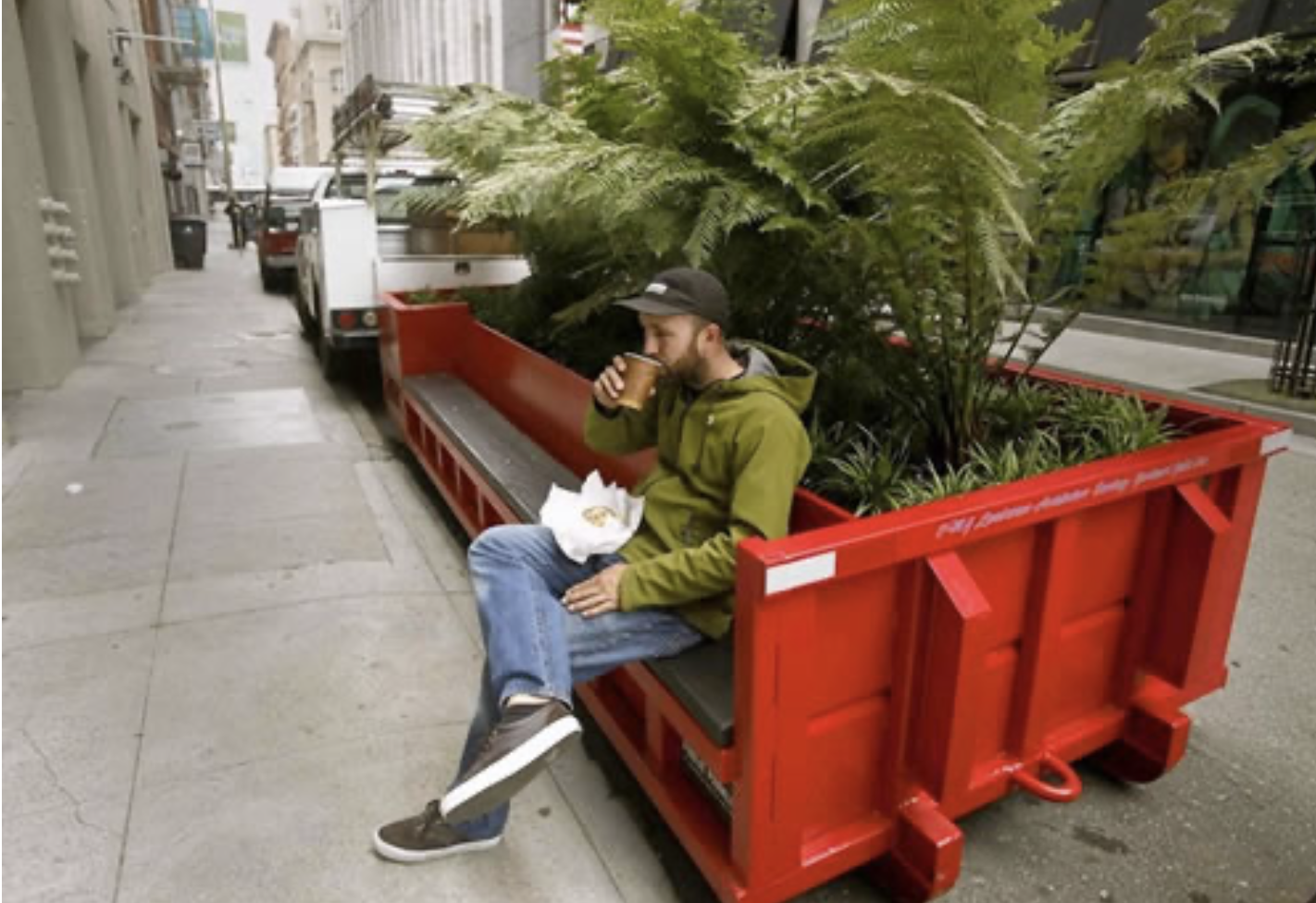
Glitter Sucks

I hate glitter. Screw fun.
And it’s terrible for the environment too. Studies of traditional plastic glitter (and natural glitter – made from the mineral mica) were both bad for the environment, by testing plant growth in water in the presence of the glitters:
The research found that after 36 days, the presence of glitter halved the root length of common duckweed (Lemna minor), while levels of chlorophyll in the water were three times lower than in control conditions, indicating reduced levels of phytoplankton, or microalgae.
Glitter is used in a variety of decorative ways, including on clothing, in arts and crafts, and in cosmetics and body paint. Traditional glitter is a form of microplastic consisting of a plastic core made of polyester PET film, which is coated with aluminum and then covered with another thin plastic layer.
Along with other forms of single-use microplastics, such as microbeads, there have been efforts to phase out PET glitter with the introduction of more biodegradable alternatives.
One version has a core of modified regenerated cellulose (MRC), sourced mainly from eucalyptus trees, but this is still coated with aluminum for reflectivity and then topped with a thin plastic layer. Another form is mica glitter, which is increasingly used in cosmetics.
However, this new study found that the effects of MRC and mica glitters on root length and chlorophyll levels were almost identical to those of traditional glitter.
Wild Predators Are Relying More on Our Food—and Pets

SOME OF NORTH America’s big predators—wolves, mountain lions, bobcats, and the like— are now getting nearly half their food from people. It’s a big shift away from eating foods found in nature and could put them in conflict with one another, or lead to more human-carnivore encounters on running trails or suburban backyards.
The complete list of these carnivores studied in the report includes foxes, coyotes, fishers, and martens.
How did they know this? The team used chemical isotopes of carbon taken from the animals’ fur and bone samples to distinguish between human-grown and naturally occurring foods. “Human foods look like corn, because we give corn to everything,” Manlick says. Corn syrup can be found in many processed foods, while corn grain is fed to beef, chicken, and pork that humans eat. But corn looks very different than natural foods when analyzed in the lab.
Source: Wired
Silent, home rooftop wind turbines
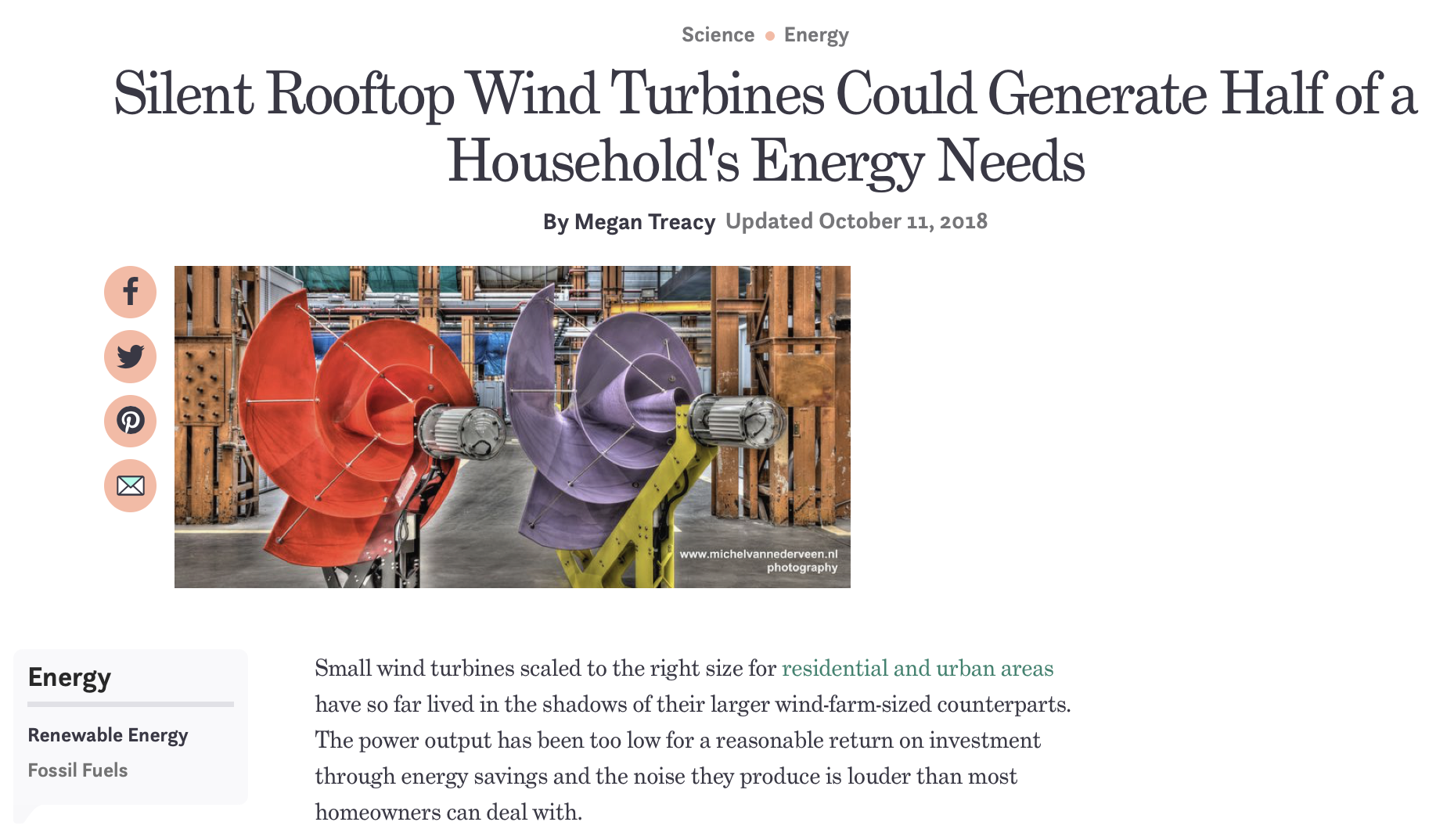
Small wind turbines scaled to the right size for residential and urban areas have so far lived in the shadows of their larger wind-farm-sized counterparts. The power output has been too low for a reasonable return on investment through energy savings and the noise they produce is louder than most homeowners can deal with.
A Dutch renewable energy start-up called The Archimedes is working to solve both of those problems in a new class of small-scale wind turbine — one that is almost silent and is far more efficient at converting wind into energy. The company states that the Liam F1 turbine could generate 1,500 kWh of energy per year at wind speeds of 5m/s, enough to cover half of an average household’s energy use.
When used in combination with rooftop solar panels, a house could run off grid. “When there is wind you use the energy produced by the wind turbine; when the sun is shining you use the solar cells to produce the energy,” The Archimedes CEO Richard Ruijtenbeek said.
